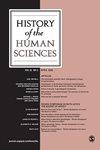“福利国家”思想在英国政治话语中的出现
IF 0.5
2区 历史学
Q2 HISTORY & PHILOSOPHY OF SCIENCE
引用次数: 2
摘要
本文追溯了福利国家一词在英国政治话语中的出现,并描述了界定其含义的竞争努力。它呈现了福利国家概念的出现及其随后融入各种政治剧本的谱系,追溯了试图命名、定义和叙述福利国家含义的斗争。它表明,这个概念是在它所提到的核心方案已经颁布成为法律之后才出现的,而且这个概念的所指和意义从来没有得到普遍同意- -甚至在1940年代后期形成这个概念的时候也没有。在20世纪50年代,福利国家的概念被分为三种不同的含义:(a)福利国家是一套社会保障计划;(b)福利国家作为一种社会经济制度;(c)福利国家是一种新型的国家。这些用法都是由对立的政治参与者使用的,尽管它们的范围、含义、价值和含义都不同。文章认为,福利国家的概念并不是作为一种独立的、已经构成的现实的代表来运作的。相反,这个概念在那个时期的政治和经济争论中——以及后来关于工党政府战后成就性质的争论中——的使用总是完全是修辞性的和构成性的,它的使用者旨在塑造他们声称仅仅是描述的转变和结果。本文章由计算机程序翻译,如有差异,请以英文原文为准。
The emergence of the idea of ‘the welfare state’ in British political discourse
This article traces the emergence of the term welfare state in British political discourse and describes competing efforts to define its meaning. It presents a genealogy of the concept's emergence and its subsequent integration into various political scripts, tracing the struggles that sought to name, define, and narrate what welfare state would be taken to mean. It shows that the concept emerged only after the core programmes to which it referred had already been enacted into law and that the referents and meaning of the concept were never generally agreed upon – not even at the moment of its formation in the late 1940s. During the 1950s, the welfare state concept was being framed in three distinct senses: (a) the welfare state as a set of social security programmes; (b) the welfare state as a socio-economic system; and (c) the welfare state as a new kind of state. Each of these usages was deployed by opposing political actors – though with different scope, meaning, value, and implication. The article argues that the welfare state concept did not operate as a representation reflecting a separate, already-constituted reality. Rather, the use of the concept in the political and economic arguments of the period – and in later disputes about the nature of the Labour government's post-war achievements – was always thoroughly rhetorical and constitutive, its users aiming to shape the transformations and outcomes that they claimed merely to describe.
求助全文
通过发布文献求助,成功后即可免费获取论文全文。
去求助
来源期刊

History of the Human Sciences
综合性期刊-科学史与科学哲学
CiteScore
1.60
自引率
11.10%
发文量
31
审稿时长
>12 weeks
期刊介绍:
History of the Human Sciences aims to expand our understanding of the human world through a broad interdisciplinary approach. The journal will bring you critical articles from sociology, psychology, anthropology and politics, and link their interests with those of philosophy, literary criticism, art history, linguistics, psychoanalysis, aesthetics and law.
 求助内容:
求助内容: 应助结果提醒方式:
应助结果提醒方式:


